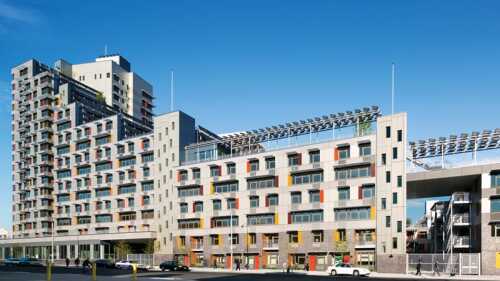It is not often that open-ended real estate funds are the lead item on the BBC breakfast news broadcast. But for a week in late June, the funds set up for U.K. mom-and-pop investors to put their money into real estate became the public face of the financial cataclysm brought about by Brexit, the vote calling for Britain to exit the European Union.
Coiffured news anchors talked about redemption gates, liquidity provisions, and discounts to net asset value—topics normally confined to offices in London’s Square Mile, the heart of the financial district.
Along with the plunging value of the pound and stock market, those funds, with total assets of about £24 billion (US$31 billion), were one of the most visible signs of the negative effects awaiting the United Kingdom—and real estate—as a result of the vote to leave the European Union.
However, it is never quite that simple. Some of those funds remain closed to investors, but some have opened after quickly selling assets and writing down the value of their portfolios by 5 to 10 percent.
Some major U.K. assets sales have been pulled from the market due to the uncertainty created, but global funds have been queuing up to buy into a market that for many became 15 percent cheaper overnight because of the decline in sterling.
Investment banks and major manufacturers have issued warnings about needing to relocate some or all of their operations outside the United Kingdom, but major occupiers have also committed to London, and foreign banks are lending to huge, partly speculative office buildings in the City of London.
For the United Kingdom, a long, slow, sometimes painful process of adjustment to a new world is only beginning. And while the initial reaction was perhaps overly negative, a subsequent readjustment and insistence from the market that it is business as usual is perhaps overly positive as well.
Effects Outside Britain
Beyond U.K. shores, the same phenomenon also holds true, only sometimes in reverse. For Europe, an initial excitement about the prospect of stealing investment capital and occupiers from the United Kingdom has been replaced by worries about the potential negative consequences of huge inflows of capital to Germany creating further inequalities within the Eurozone. For the United States, Brexit keeps interest rates low and highlights the country’s status as a safe haven for investors.
But on the whole, Britain’s decision to leave the European Union simply creates more uncertainty in a world that seems increasingly fraught with geopolitical risk. And, investors might ask, if the United Kingdom, a market that once was seen as the safest of havens, suddenly becomes a riskier prospect, where can they truly feel safe investing?
One thing has become increasingly certain in the months following the Brexit vote: global investors are by no means shunning the United Kingdom and London. In the week after the vote, a U.K. open-ended fund managed by Aberdeen Asset Management that had closed to redemptions sold a property on Oxford Street in London’s West End to Norway’s sovereign wealth fund, Norges Bank Investment Management, for £124 million (US$162.5 million), a 3 percent yield—hardly a fire-sale price.
Many global funds that have been priced out of London for the past 12 to 18 months as values smashed through record peaks now see the potential dislocation that could be caused by Brexit as an opportunity. Such is the hunger for real estate deals, given the low bond yields around the world, that an event that could cause a significant downturn in the United Kingdom is grasped as an opportunity as much as a risk. That sense is coupled with the faith investors have that London will remain a global financial and cultural capital whatever the result of negotiations with the European Union.
“Everyone seems to want to be countercyclical in the same way,” says Nathalie Palladitcheff, executive vice president at Canadian pension fund Ivanhoe Cambridge. “In London, you may go there trying to be opportunistic and make a deal following Brexit, but then you bump into everyone else trying to do the same.”
“We believe that over the next 12 to 18 months there might be some good buying opportunities,” affirms Ruslan Alakbarov, head of real estate at Sofaz, the sovereign wealth fund of oil-rich Azerbaijan. “Any general falling values coupled with the recent fall in sterling means that for dollar-based investors like us, you have just seen a fall in values that makes it 15 percent cheaper compared to last year.
“And the fundamental factors about U.K. real estate haven’t changed. [London] still remains one of the most liquid, deepest, and most commercially vibrant cities in Europe,” Alakbarov adds. “That won’t change as far as sovereign wealth funds are concerned. The U.K. government gives significant advantages to the sovereign wealth community and gives us an exemption from taxes, and no other European country does that. These factors won’t change, and London will still be a key financial player. That isn’t going away.”
The problem for those investors will be that no one wants to sell, fearing, as they do, that the market has softened. Whereas logic and sentiment might indicate liquidity is still available for London and U.K. property, this probably only applies to the very best assets, and vendors are worried about putting assets up for sale and finding there is no buyer at the price they are seeking. “I think London offices had already repriced by 10 percent before Brexit,” says Pete Reilly, head of European real estate at J.P. Morgan Asset Management. “If it goes down another 10 percent, combined with the currency decline, you would be able to find ten buyers for a good-quality asset. If it stays at the level it is at now, there are still buyers. The trouble is, at the moment nothing is for sale.”
Brexit has certainly had a chilling effect on U.K. investment volumes, whether that reticence is mainly among buyers or sellers, and in the run-up to the vote this spread to Europe, too.
Data from Real Capital Analytics show that U.K. investment volumes fell by 53 percent in the second quarter, which comprises mainly the run-up to the June 23 vote, compared with the same period last year. Continental Europe excluding the United Kingdom saw a 10 percent decline.
But in the United Kingdom, that was a drop from the best second quarter ever, and the figure for the second quarter of 2016 is almost in line with the ten-year average for the period, down only 1 percentage point. And for the Continent, results for the second quarter remained 25 percent higher than that long-run average.
On the capital value side, Brexit caused values for all U.K. commercial real estate to fall 4 percent on average in June, according to data from index provider MSCI IPD.
On both metrics, a cooling of markets that had significantly surpassed historic peaks is perhaps no bad thing.
“Our central London offices price index shows that prices in London were 70 to 80 percent above their 15-year average,” says Tom Leahy, director of Europe/Middle East/Africa (EMEA) market analysis at Real Capital Analytics. “You have to put this in context: the indications are that values were starting to drop off at the end of last year from a record-high level.”
Whereas the investment market has seen a shift from panic in the early days after the vote to greater confidence as time has passed, the U.K. and London economy and occupier markets have seen a different dynamic. The prognosis from the real estate industry is positive, with many pointing to an absence of large corporate tenants putting moves on ice in the wake of Brexit and confidence that the economy will hold up.
“In terms of its impact, we just think it accelerates a process that was going to happen anyway—bringing forward the end of the cycle in the U.K. from 2018 to 2019 to the end of this year or the first quarter of next year,” says Sabina Kalyan, global chief economist and head of EMEA strategy and research at CBRE Global Investors. “And we think the U.K. may only flirt with zero percent growth for a couple of quarters, given the automatic stabilizers created by the fall in sterling and the liquidity the Bank of England has put into the market.”
Gradual Accommodation
But initial positive indications aside, the occupier market is likely to exemplify the long, slow, uncertain road to normality that U.K. real estate will now travel.
In London, investment banks such as Goldman Sachs and J.P. Morgan have indicated through public utterances or regulatory filings that they are exploring moving some of their functions outside London.
“We don’t think the office market will crash, but there will be some sort of rental correction, especially in the City and Midtown markets, stemming from the fact that big corporates will put their plans on hold until the picture becomes more clear in the U.K.,” says Alakbarov.
Outside London, automakers Ford and Nissan have also both proposed the possibility of moving jobs from Britain if the United Kingdom cannot negotiate trade deals that keep their costs at current levels. And the Purchasing Managers Index (PMI), a confidence measure released by Markit in early August, indicated that sentiment among businesses points to a United Kingdom that is heading for a recession, with an inevitable impact on occupier markets and rental levels.
Beyond the United Kingdom, some interesting ripples can be seem in the global pond of real estate. The United States, for example, may be a significant beneficiary. “It is very difficult for the U.S. to raise rates now with pretty much every other major central bank in the world undertaking monetary easing,” says Kalyan.
“In the U.S., Brexit has helped postpone a Federal Reserve rate hike and push down interest rates on long-term Treasuries, preventing a cap rate increase in that market,” adds Palladitcheff. “Without Brexit, returns for big global investors would have been worse in the U.S., as there was a strong likelihood that both interest rates and cap rates would increase. Instead, the recent cut in the Bank of England’s short-term interest rate made the U.S. a safe haven again.”
For Europe itself, of course, worries exist that a U.K. recession will hit the broader European economy. Dublin, in particular, which has seen the biggest recovery in asset prices and office rents anywhere in Europe since the financial crisis, would be most exposed, given that the United Kingdom is Ireland’s largest trading partner, accounting for about 20 percent its international trade.
Italy’s banking crisis also seems to have been accelerated by Brexit. The failure of Banca Monte dei Paschi di Siena in recent European Central Bank stress tests has thrown a spotlight on the €330 billion (US$369 billion) nonperforming loan burden still weighing on that sector, although latent problems would have come to the fore eventually.
But on the whole, Europe has proved resilient, with the same PMI indicators that predicted a U.K. recession indicating continued European growth, albeit at low levels.
For investment, the expectation is that any reduction in capital heading to the United Kingdom will target other perceived safe havens, such as Germany, the Nordic states, and to a lesser extent Paris.
Provisional Real Capital Analytics data for July, the first full month after the referendum for which numbers are available, show that the United Kingdom lost its usual place at the top of the European investment league table, placing second—to Germany—for the first time since 2011.
“You have to be careful because it is just one month over the summer period,” says Leahy. “But there was 35 percent more investment in Germany than in the U.K. in July, and the U.K. was significantly below its average for that month. To say that Germany is now the safe haven is a bit of a cliché. What we saw in the first half of the year as a whole was that the markets where volumes held up well were Sweden, Italy, the Netherlands, Poland, and Spain, while the U.K. and Germany saw falls.
“So the center of gravity has shifted away from the U.K., although there is still a lot of capital sat on the sidelines waiting to invest in European real estate, and some of it will find a home in the U.K.,” he says.
The idea of a safe haven may indeed be a cliché, but it is one that real estate, and particularly London and the United Kingdom, have held dear in the years following the financial crisis. The fact that real estate was tangible, and that the rule of law was unchanging, were key benefits for the sector and the country in a world that seems increasingly volatile and uncertain.
But if the United Kingdom can change the rules, what hope does an investor have of putting money anywhere with certainty?
“You have to ask what is safety today,” says Zsolt Kohalmi, Starwood Capital partner and head of European acquisitions. “Everyone says Germany, but there is an election there next year. I could buy a core building in Madrid, but you have elections there and the government changes. You have to spend a lot of time figuring out what you think about the macro situation.”
However the situation surrounding Brexit plays out, the United Kingdom on June 23 removed one of the pillars of certainty that the world and the real estate sector held true. It will take a long time for that certainty to return.
Mike Phillips is editor of EuroProperty.






